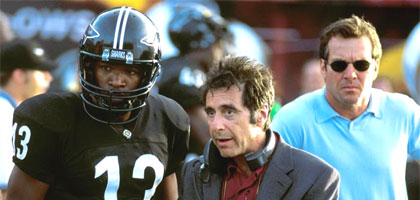
Oliver's army
Film of the Month: Any Given Sunday

Any Given Sunday may look like a film about US football, but it's still solid Oliver Stone all the way, argues Mark Kermode
After the almost wilful uncertainty of U Turn, Hollywood's most belligerent auteur Oliver Stone returns to the terrain he knows best: the visceral depiction of the strange bonds between men at arms. Despite its recreational subject matter, Any Given Sunday attempts to do for American football what Wall Street did for the cut-throat world of high finance: turn it into a war zone as deadly as any portrayed in Stone's more overtly military movies. Owing less to the dewey-eyed philosophising which made the baseball movie Field of Dreams an international hit than to the meat-grinding menace which kept William Friedkin's basketball film Blue Chips out of UK theatres altogether, Stone's 'homage to Robert Aldrich' (director of The Dirty Dozen, 1967, and the football movie The Longest Yard, 1974) is a tale of warriors at work. From starting gun to final whistle, we are dragged brusquely from the touchline to the huddle to the post-game shower, leaving us battered and bruised from our encounter with Oliver's army. What else would you expect?
Opening with a quotation from Vince Lombardi which exalts those lying 'exhausted on the field of battle', the screenplay (by Stone and John Logan) harks right back to Platoon, with the footballers learning - much like those Vietnam GIs - that only when they rely on each other do they have any chance of survival. Centring the relationship between old-style coach Tony D'Amato (Al Pacino) and rising star Willie Beamen (Jamie Foxx), Any Given Sunday throws endless issues into the mix - race, gender, wealth - only to conclude that nothing is relevant except teamwork. As Pacino declares in one of his many rants, "We either heal now as a team, or we will die as individuals."
For D'Amato, of course, that message has been lost along with the rules of engagement which once determined fair play on the field. The culprit in his eyes (and presumably the director's) is the media, or more specifically television. Stone suggests this medium's omnipresence by filtering the film through a variety of formats, presenting a channel-surfing assault on the eyes and ears. Just as JFK jittered between jumpy Zapruder-style Super-8, grainy black-and-white film and urgently colourful scope to represent the multiple versions of Kennedy's assassination, so Any Given Sunday vibrates with incessant montage, split-screen effects and freeze frames, turning the game into an MTV-style meltdown. (However, nearly 10 minutes of football footage has been cut for the UK release.) From the opening seconds, the first voice we hear is not that of a player or a coach, but of a commentator (Stone himself joining the howling throng) whining that things do not look good. D'Amato - permanently wired for sound - struggles to be heard over the endless cacophony of television spin doctors and franchise contractors who buzz around the screen and the soundtrack, distracting attention from the final goal. 'TV changed everything,' mumbles Tony. 'The first time they stopped the game to cut away to some fucking commercial, that was the end of it.'
The fervour with which Stone sinks his teeth into his ancient enemy at times approaches quasi-religious devotion. While the bone-crunching moments of self-sacrifice on the field are often accompanied by slo-mo visions of the heroic past, the bite-sized fragments of televised temptation gradually assume demonic stature as the players are dragged down into a hell of sponsored self-interest. 'Speak of the devil,' says Tony's comrade-in-arms as the record-selling, product-pushing image of Beamen flickers on to the screen. Later, Beamen himself (whose mother thinks that Sunday is for church, not sport) tells his platoon of the demonic possession which turned him from team-player into solo-flyer. 'It wasn't me,' he says, 'it was the devil,' a confession delivered with none of the irony of Natural Born Killers. This time Stone really seems to mean it.
Underpinning all this angst is a more down-to-earth, father-son motif which runs alongside the military and media metaphors. Both Tony and Willie have lost their fathers: Tony's died on the battlefields of World War II; his own children have lost him on the football fields. 'My daddy died because of this,' says team president Christina Pagniacci (Cameron Diaz), surveying the legacy she has inherited from her own father. Later, in her only moment of emotional vulnerability, Christina overhears her mother (splendidly played from the bottom of a Martini glass by Ann-Margret) note that Christina's dad always wanted a son. In the end, of course, she cannot be his son (or a good team president) because she doesn't really love football. It's a guy thing and she simply doesn't have the balls.
It's perhaps inevitable (if regrettable) that Any Given Sunday deals such a lousy hand to its female characters. Diaz often seems to be in a different, more glassy movie to the whirlpool-eyed Pacino, although it's tempting to attribute her fish-out-of-water quality to a screenplay which essentially casts her as an interloper throughout. Elsewhere, the shrill harpiness of the assembled team wives borders on caricature, as does Lauren Holly's tight-skinned bitch who refuses to allow her ailing husband Dennis Quaid to retire gracefully. Like Christina, she's more concerned with pay packets than with the game, and like her sister-in-crime she's vilified for not being one of the guys. It's locker-room stuff and if you don't like the smell of testosterone, then Stone's film may not be the perfect way to spend a Sunday.
As for the guys, however, they're a splendidly solid bunch throughout, from Pacino's permanently ruffle-headed coach who can make even a tuxedo look dishevelled, to Foxx's word-perfect TV hero, whose on-air interview style is unnaturally natural. But as ever with an Oliver Stone movie, it's the supporting players who win the game, from James Woods and Matthew Modine stealing home as the nice-and-nasty team medics, to LL Cool J as the preening former prize-winning player. Few directors could command such an impressive roster and Stone wisely ensures no one is wasted or left on the substitute bench without a chance to score.
There's a dazzling diversity too in the musical score. Revelling in the opportunity to push the ludicrous pageantry of the game beyond the touchline of taste, Stone serves up knights in armour charging around on horseback to the sounds of Black Sabbath's 'Paranoid' and forward passes from Gary Glitter to Fatboy Slim like a celluloid jukebox on random select. Elsewhere, a shower-room showdown between rap and Metallica plays out issues of black and white sporting rivalries as a Battle of the Bands. Similarly, the bone-crunching audio-effects turn every tackle into a medical trauma and there are near-subliminal cues which achieve a dreamy trippiness sadly lacking from most Hollywood fodder. This is what ultimately makes an Oliver Stone movie such fun: the unabashed enthusiasm for experimentation, the willingness to use jump cuts, side-steps and non-linear interruptions just because it might work, it just might add something. The fact that he may win only one game in three makes him all the more watchable, because even when he fails, he does so in spectacular fashion. Any Given Sunday may fall on its face a few times during the game, but wouldn't you rather watch a team going recklessly for the touchdown than playing safely for time?
